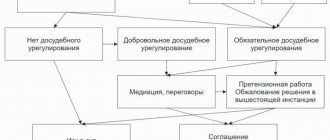Courts: definition, types, essence and features
- first judicial instance (or court of first instance) - conducts initial consideration of cases and makes decisions on them;
- the second judicial instance - considers appeals against the decisions of the first in the period before they have yet entered into force;
- cassation - determines the legality and legality of decisions made by the first and second instances that have already entered into force (does not concern the essential component of the case and does not consider evidence);
- supervisory - has the right to verify the legality of decisions of the cassation service that have entered into force;
- court on newly discovered circumstances of previously considered cases.
Judicial instances are courts that are assigned a certain role in the general judicial system of the state. Within their jurisdiction, they can hear claims or determine the legality of decisions made by lower courts. It is worth noting that the Constitutional Court is the highest court, and therefore its decisions are final and cannot be appealed or revised.
Proceedings in the court of second instance include proceedings in the courts of appeal and cassation. What unites the appellate and cassation instances as courts of second instance is that both of them carry out verification of court decisions that have not entered into legal force.
The court of second instance is a review of the legality and validity of sentences and other court decisions, which, as a rule, have not entered into legal force. In the system of courts of general jurisdiction (both civil and military), all courts can act in this capacity (with the exception of the garrison military court), in the subsystem there is an arbitrator. courts - federal arbitration courts of districts.
In accordance with Part 5 of Art. 330 of the Code of Civil Procedure of the Russian Federation, if the court establishes the grounds provided for in Part 4 of Art. 330 of the Civil Procedure Code of the Russian Federation (similar to the grounds under the Arbitration Procedure Code of the Russian Federation), in order to cancel the appealed decision, the appeal will also consider the case according to the rules of the first instance, having issued an appropriate ruling.
- leave the verdict or other judicial act unchanged, and, accordingly, do not satisfy the complaint;
- when overturning a conviction, render an acquittal;
- reversing a guilty verdict, pronounce another guilty verdict;
- overturn the verdict and transfer the case back to the court of first instance for a new trial;
- reversing an acquittal, render an acquittal;
- by canceling the procedural decision of the first instance, render a verdict of acquittal or make another decision;
- having canceled the court decision, return the case to the prosecutor;
- by canceling the judicial act, dismiss the case;
- change the sentence or other decision that is being appealed;
- terminate the appeal proceedings.
Third instance of the arbitration court (cassation)
The third level is formed by 10 federal arbitration courts of districts, each of which operates as a cassation instance in relation to a group of arbitration courts that make up one judicial district.
In the cassation instance, decisions of arbitration courts are checked from the standpoint of the correct application of the rules of substantive and procedural law. Decisions of the first instance or a ruling of an appellate arbitration court that have entered into legal force may be appealed through cassation proceedings. The appeal takes place by sending a cassation appeal with the necessary documents attached to the court. A cassation appeal can be filed within two months from the date of entry into legal force of court decisions and rulings.
The cassation court checks the legality of decisions and rulings adopted by the first and appellate instances of arbitration courts. Based on the results of the consideration, the cassation instance of the arbitration court has the right to make one of the following decisions:
- leave the decision of the arbitration court of first instance and (or) the decision of the appellate court unchanged, and the cassation appeal not satisfied;
- cancel or change the decision of the court of first instance and (or) the decision of the court of appeal in whole or in part and, without remitting the case for a new trial, adopt a new judicial act;
- cancel or change the decision of the first instance and (or) the decision of the arbitration court of appeal in whole or in part and send the case for a new trial to the relevant arbitration court, the decision of which was canceled or changed;
- cancel or change the decision of the court of first instance and (or) the decision of the court of appeal in whole or in part and transfer the case to another arbitration court of the first instance or appeal within the same judicial district;
- leave in force one of the previously adopted decisions or resolutions in the case;
- cancel the decision of the first instance of the arbitration court and (or) the decision of the appellate court in whole or in part and terminate the proceedings in the case, or leave the statement of claim without consideration in whole or in part.
Court
The second stage of consideration of a dispute is an appeal - a retrial of a case on which a decision has already been made. It is necessary to start an appeal before the decision of the first instance court comes into force (usually this happens within a month).
When going to court, each party hopes that a positive resolution to their dispute will be made at the first meeting. In reality, there are not as many such cases as all participants in the process would like. A significant part of disputes is reviewed first on appeal, and sometimes even referred to the court of cassation.
We recommend reading: What single mothers are entitled to from the Samara state
The complaint is filed through the court that made the decision, so that all the case materials are sent along with it. In this case, a fee is paid and copies of complaints are prepared according to the number of defendants. Persons participating in the case have the right to submit explanations to the complaint (submission) with documents confirming these explanations. This may help cassation judges when studying the case.
In some cases, when making court decisions, judicial errors occur, leading to the issuance of illegal and unfounded decisions. Proceedings in a court of second instance are aimed at checking the legality and validity of decisions that have not entered into legal force and eliminating errors. It can be appeal or cassation.
Thus, the essence of appeal and cassation proceedings
consists of checking by a higher court the legality, validity and fairness of sentences and other court decisions that have not entered into legal force, based on a complaint from a participant in the process or on the proposal of a prosecutor.
Main difference
The difference between the appellate and cassation procedures for reviewing court decisions that have not entered into legal force is that the appellate court has the right to re-examine the case on its merits. At the same time, he can re-examine the evidence (interrogate witnesses, victims, defendants, etc.) and make a new verdict in the case.
The second court in our country is an appellate court. From the moment when the decision of the court of first instance is recorded in writing, a participant in the process who is dissatisfied with the court decision has the right to file an appeal within one calendar month. The complaint, according to the law, is filed with the office of the court that made the decision in the case (court of first instance).
When it is obvious that the hearing of a case in the first court does not have the most promising prospects for one of the participants in the process, it makes sense to prepare in advance for the consideration of the case in the second court. Thus, if the case is lost, the chances of the interested party to cancel or change the decision of the trial court increase.
Concept and characteristics of courts. Court of First Instance
The process of passing a dispute in the judicial authorities is a set of different stages, phases, instances, formalized by the issuance of relevant procedural acts, and characterized by the presence of their own goals and objectives.
One of the key categories when considering the corresponding sequence is the institution of courts, the definition of which can be formulated as follows:
Definition 1
Courts are separate courts or structural divisions of the court (presidium, panel, etc.), which are assigned strictly defined tasks related to the consideration and resolution of court cases, verification of their legality, validity, etc. . The essence of these tasks is the basis for classifying courts into separate instances.
Finished works on a similar topic
- Coursework Court instance 410 rub.
- Abstract of the court instance 240 rub.
- Test work of the Court Instance 210 rub.
Receive completed work or specialist advice on your educational project Find out the cost
In other words, the court is elected based on the tasks currently facing the person whose right is allegedly violated or challenged.
The fundamental judicial authority, within which any case is necessarily considered and resolved on its merits, or terminated on other grounds, is the court of first instance.
Note 1
Court of First Instance We have already completed course work
The concept and types of rulings of the court of 1st instance in more detail - this is an independent jurisdictional body, the scope of which covers the direct investigation and establishment of the circumstances of the case at a court hearing, prior to the issuance of a final decision in the case - a sentence or decision.
Do you need to select scientific articles for your academic work? Specify a topic and receive a response in 15 minutes get help
an abstract on this topic
Statehood of Russia.
in more detail, justices of the peace, district courts and courts of constituent entities of the Russian Federation (as well as military courts equivalent to them), as well as judicial panels of the Supreme Court of the Russian Federation. On this topic, we have already completed an essay on
the Supreme Court of the Russian Federation and the system of courts of general jurisdiction. , in relation to the system of arbitration courts, the Arbitration Courts of a constituent entity of the Russian Federation act as the court of first instance. On this topic, we have already completed
coursework
on the system and powers of the arbitration court of a constituent entity in more detail.
Speaking about specific examples of cases referred to consideration by a specific court of first instance, it should be noted that, for example, magistrates can consider criminal cases of crimes with a maximum sentence of up to three years in prison, uncontested civil cases (on the issuance of a court order), some family law disputes, etc. The court of a constituent entity of the Russian Federation at first instance considers a small number of grave and especially grave crimes - murder under aggravating circumstances, creation of an illegal armed group, etc. ]
At the same time, it is necessary to pay attention to the fact that the competence of the courts of first instance can be formed both by indicating specific types and categories of cases under consideration, and by establishing a residual principle, as is done in the Russian Federation for district courts.
The concept of the court: definition, scheme, meaning
The appeal system reviews judicial acts that have not entered into force. This happens only at the request of the parties who file the appeal. In civil and arbitration proceedings, the period for filing a complaint is 1 month, and in criminal proceedings - 10 days. The court must verify the legality and validity of the appealed act by examining the evidence. And in the criminal process, an important factor is also taken into account - justice.
- Complaints and protests against court decisions and rulings of the courts of first instance that have not entered into legal force.
- Decisions, determinations and regulations that have entered into legal force.
- New circumstances have emerged regarding decisions, rulings and decrees that have entered into legal force.
The cassation instance analyzes court cases considered in the first instance, which also have not entered into legal force. The second instance is intended to control the activities of the lower levels of the judicial system. It is a kind of protection against the incorrect application of legal norms and the imposition of illegal sentences.
- Introductory part - contains general information about the work of the court;
- Descriptive part – contains information about decisions made or other judicial acts;
- Motivation part - includes references to legislative norms;
- The operative part informs about the decision made. Contains specific instructions and conclusions about the legality of decisions or orders of the lower court.
We recommend reading: Annual Bonus for Sberbank Employees
Courts are divided into judicial instances in accordance with the functions they perform (making decisions on the merits of the case, checking the legality and validity of these decisions).
In civil and criminal proceedings, there are courts of the first, second and supervisory instances.
Court of First Instance
The trial court is the court authorized to decide on the merits of the issues fundamental to the case.
Usually citizens turn to the main level court, i.e. to the district (city) court, and currently to the magistrate (he considers cases as a court of first instance).
Decisions or sentences of these courts - before they enter into legal force - can be appealed to a court of second instance.
In civil cases, the essence of the case is usually the question of whether the claim brought is proven or not and the legal consequences that should occur. When considering a civil case, the court of first instance is obliged to hear the explanations of the persons participating in the case, the testimony of witnesses, expert opinions, read written evidence, examine physical evidence, etc.
Any court, including higher courts, can act as a court of first instance.
Court of second instance
A court of second instance is a court that hears a case on a cassation and appeal or a presentation against decisions and sentences of a court of first instance that have not entered into legal force.
If the case was considered by the court, then citizens have the right to file a cassation
a complaint to the court of second instance (they also say
the court of cassation
). Any court, except the main level courts, can act as a cassation court.
If the case was considered by a magistrate, then citizens have the right to appeal
a complaint to the court of second instance (they also say
the court of appeal
). The main level court (district (city) court) acts as an appellate court.
The case may be considered by the court of second instance also upon the presentation of
prosecutor (cassation or appeal).
After the case is considered by the court of second instance, the decision of the court of first instance either enters into legal force or is canceled and transferred for a new trial to the court of first instance.
Supervisory authority
Supervisory authority - courts that have the right to verify the legality and validity of court decisions and sentences that have already entered into legal force.
Citizens can appeal decisions or sentences of courts of first and second instance to the court of supervisory authority by contacting it with the supervisory authority
complaint, and the prosecutor and other officials may submit a supervisory
request
for review.
In the system of courts of general jurisdiction, presidiums of mid-level courts, as well as collegiums, presidium, and the Plenum of the Supreme Court of the Russian Federation can act in this capacity.
What is a “higher court”
A higher court is a court that occupies a higher level in relation to a given court.
Thus, the cassation instance is superior to the courts of first instance.
What is the "highest court"
The highest judicial authority is called the Supreme Court of the Russian Federation, as well as the Supreme Arbitration Court of the Russian Federation.
Proceedings in the appellate court
A full appeal is a type of appeal that means that the case is reconsidered by the appellate court according to the rules in force in the first instance, and the parties have the right to present new facts and evidence. In a full appeal, the appellate court checks not only the decision of the trial court itself, but also the case itself, re-examining its legal and factual aspects. In case of a full appeal, the appellate court is deprived of the right to return the case for a new trial to the court of first instance and must itself adopt a final act on it in the form of a decision or ruling.
- failure to comply within the prescribed period with the judge’s instructions contained in the ruling on leaving the complaint or presentation without progress;
- expiration of the appeal period, if the complaint or presentation does not contain a request for restoration of the period or its restoration is refused.
3. The principles of justice are of a general nature, since they establish the main directions of the organization and activities of the judiciary. In addition, all principles of justice are enshrined in law, due to which they acquire precision in formulation and become generally binding.
1. By their nature, principles are objective-subjective in nature. The objective aspect of the principles (initial, fundamental principles) is reflected and enshrined in the norms of various branches of legislation regulating law enforcement activities, and because of this is a powerful factor of legal reality. The principles reflect the most general patterns of organization of judicial bodies and permeate the regulation of all stages of legal proceedings. Moreover, in criminal proceedings, in particular, the principles are manifested not only in the trial, but also at the stages preceding it (inquiry, preliminary investigation).
You can file a cassation yourself if you take into account all the procedural nuances of the cassation procedure. It is important to know that any wrongful decision seriously affects the authority of the judge. Therefore, a positive review of court decisions that have entered into force is the exception rather than the rule. After all, if there is an error in the decision, it must be promptly corrected at the stage of appeal consideration. Winning in the court of cassation and in subsequent instances is the highest achievement even for the most experienced lawyer.
Important: the content of a cassation appeal is fundamentally different from the content of the initial statement of claim and appeal. Therefore, there is no need to duplicate information and rely on the sample claim. The cassation appeal is written “from scratch”, taking into account the fact that this authority takes into account exclusively “errors of law”.
Court decisions
The term was reduced by 6 times: defense of the accused under Article 228.1 of the Criminal Code of the Russian Federation
Justice triumphs: the case of payment of a large penalty
Apartment disputes: eviction of a family member
Unwanted neighbor: how to defend your rights to an apartment?
Registration of trademarks and service marks in a short time
You are not obliged to pay for imposed services
Explain the difference between a court of first instance and a court of second instance
In the Russian Federation, the courts of first instance are: Magistrate, District Court, Garrison Military Court, Court of General Jurisdiction at the level of a constituent entity of the Russian Federation (Supreme Court of the Republic within the Russian Federation, Territory, Regional Court, Court of a Federal City, Court of an Autonomous Region and Court of an Autonomous District) , District (Navy) Military Court, Arbitration Court of a constituent entity of the Russian Federation, Judicial Collegium for Criminal Cases of the Supreme Court of the Russian Federation, Judicial Collegium for Civil Cases of the Supreme Court of the Russian Federation, Military Collegium of the Supreme Court of the Russian Federation, Supreme Arbitration Court of the Russian Federation.
We recommend reading: If When Buying an Apartment with a Mortgage One Spouse Relinquishes the Property Does He Have the Right to Write It Out to Nowhere
Proceedings in the court of second instance include proceedings in the courts of appeal and cassation. The appellate instance is a court that considers criminal cases based on complaints and submissions against sentences and decisions of the court (magistrate) that have not entered into legal force. The cassation instance is a court that considers criminal cases based on complaints and submissions against sentences, rulings and decisions of the courts of the first instance (with the exception of magistrates) and the appellate instance that have not entered into legal force. What unites the appellate and cassation instances as courts of second instance is that both of them carry out verification of court decisions that have not entered into legal force. The essence of cassation proceedings is that court decisions made by courts of first and appellate instances, except for decisions made by magistrates, before they enter into legal force, can be appealed by the parties to a higher court. Cassation ensures control over the correctness of decisions made by lower courts and thereby ensures close contact and continuity in the activities of courts of all instances.
First instance of the arbitration court
The first instance of arbitration courts includes the courts of the constituent entities of the Russian Federation. These include arbitration courts of republics, territories, regions, federal cities, autonomous regions, and autonomous districts. The total number of first-level arbitration courts is 81.
The claims of plaintiffs (applicants) in the field of entrepreneurial activity are first considered by the first instance of arbitration courts. The period for consideration of a dispute in arbitration is three months. Based on the results of the consideration, the judge makes a decision to satisfy the claim of the plaintiff (applicant) in full or in part, or to refuse. This decision comes into force within a month, during which time the decision can be appealed by sending an appeal and the necessary attached documents to the court of second instance.
Customer Reviews
Gratitude from Busygin A.I. I express my gratitude to Vasily Anatolyevich Kavalyauskas for the qualified management of my case, competent advice and justification for the decision, which led to compensation of the stated claims.
Sincerely, Busygin Alexander Ivanovich
26.12.2017
Gratitude from Remedova A.G. I express my gratitude to the Legal Agency of St. Petersburg, namely Denis Yuryevich Stepanov, for the assistance provided in resolving my issue, and I also express my gratitude to the entire team of the consumer rights protection society for their responsiveness and pleasant communication.
Remedova A.G. 08/17/2018
Gratitude I express my deep gratitude to lawyer Konstantin Vasilyevich for his attentive, kind, and, most importantly, very clear and competent explanation of my situation. It's nice to know that the world is not without good people. I wish Konstantin Vasilyevich good health, success in everything, prosperity, good, grateful clients and all the best. Sincerely.
Gratitude from Marina Kuleshova I express my deep gratitude to Alexander Viktorovich Pavlyuchenko for his competent legal work and professionalism, as well as to his assistant Elena Vladimirovna for the qualified assistance provided. I wish you prosperity and achievement of professional heights.
Sincerely, Marina Kuleshova. 08/15/2018
Gratitude from V.N. Skorokhodova Dear Alexander Viktorovich! Let me express my sincere gratitude to you for your understanding, sensitive approach to the situation, openness, emotions and professionalism. I wish you good luck, success in your work and prosperity.
Sincerely, Skorokhodova V.N.
Review by Gavrichkova A.N. I would like to express my deepest gratitude to Yuri Vladimirovich Sukhovarov for his humane attitude towards my problem and detailed professional advice on solving it. I wish I could meet such people in my life more often.
Sincerely, Gavrichkov Alexander Nikolaevich.
Gratitude from Evgeniy N. I express my gratitude to Alexander Viktorovich Pavlyuchenko for the qualified management of my case, competent advice and informed decisions, which led to compensation for all claimed losses.
Sincerely, Evgeniy N., November 17, 2017
Gratitude from Loseva S.I. I express my deep gratitude to Sergei Vyacheslavovich (lawyer of the firm) for his very clear, accessible help in solving my problem (protecting rights as a consumer). This is the second time I have contacted you to solve my problems. Always everything......and in full.
With gratitude, Svetlana Ivanovna Loseva, 02/15/2019
Thanks to A.I. Ivanov I would like to express my gratitude to the team of the “Legal Agency of St. Petersburg”, and especially to Artem Igorevich Ivanov, for the competent actions and decision in my civil case. I dare say that this is one of the best law firms in the city, because... I became very close to the lawyers. Everything is done in a timely manner and to the point. Good luck to the team in everything.
Sincerely, Nadezhdin A.N. June 7, 2018
Review by Minina M.V. I would like to express my deep gratitude to Yuri Vladimirovich Sukhovarov for his competent advice and qualified assistance on my issue.
With gratitude, Minina Margarita Vladimirovna.








